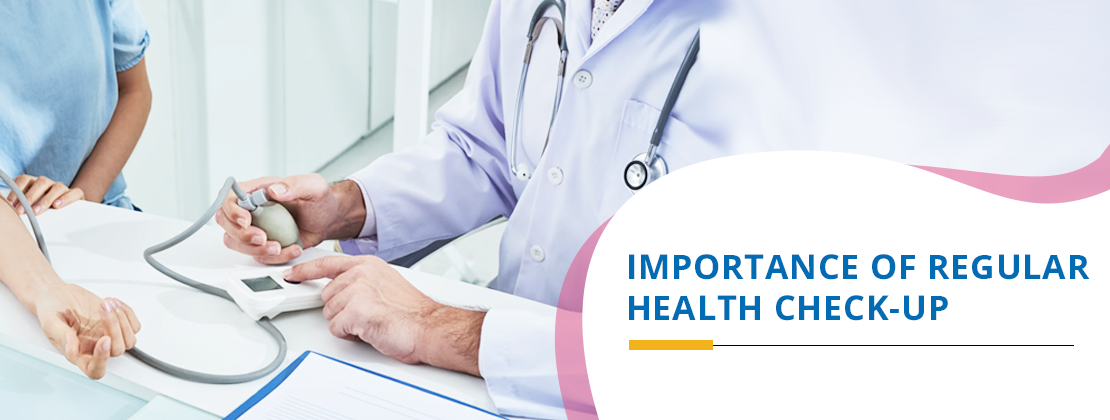
Home / Blog / Importance of Regular Health Check-up
Table of Contents
In the hustle and bustle of our daily lives, it is easy to overlook our most valuable asset—our health. We often take our well-being for granted, assuming that everything is running smoothly until something goes wrong. However, waiting for symptoms to manifest can sometimes be too late. That is where regular health check-ups come into play, offering a proactive approach to maintaining and monitoring your health.
Early detection of Health Issues: One of the primary benefits of regular health check-ups is the early detection of potential health problems. Many conditions, including diabetes, hypertension, and certain cancers, may not display noticeable symptoms in their initial stages. Routine check-ups enable healthcare professionals to identify these issues when they are most treatable.
Prevention is better than Cure: Preventive healthcare is a cornerstone of well-being. Regular check-ups allow for the assessment of risk factors and lifestyle choices that may contribute to health problems. Armed with this information, individuals can make informed decisions about diet, exercise, and other lifestyle changes to reduce the risk of disease.
Customised Healthcare Plans: Health check-ups can help healthcare providers tailor their recommendations and treatment plans to an individual’s unique needs. Whether it is adjusting medication dosages or providing dietary guidance, a personalised approach to healthcare is more effective in promoting well-being.
Peace of Mind: Regular check-ups offer peace of mind. Knowing that you are taking proactive steps to monitor and maintain your health can reduce anxiety and provide a sense of control over your well-being.
Cost-efficient: Detecting and managing health issues in their early stages is often less expensive than treating advanced conditions. Regular check-ups can potentially save individuals from costly medical bills down the road.
The frequency of health check-ups depends on various factors, including age, gender, family medical history, and existing health conditions. Here is a general guideline:
Individuals with specific health concerns or chronic conditions may require more frequent check-ups as advised by their healthcare providers.
There are various types of health check-ups tailored to different needs of the people. Let us take you through a few.
Basic Health Check-up: This typically includes a physical examination, blood pressure measurement, cholesterol screening, and blood glucose tests.
Full Body Check-up: A comprehensive assessment that covers a wide range of tests, including blood work, urine analysis, imaging (such as X-rays and ultrasounds), and specific screenings for conditions like cancer and heart disease.
Specialised Check-ups: Tailored to address specific health concerns, such as heart health check-ups, diabetes screenings, or women’s health check-ups.
Before undergoing a preventive health check-up, it is essential to have a clear understanding of the process. Here are some questions to discuss with your healthcare provider:
Clear communication with your healthcare provider ensures that you are well-prepared and informed about the entire process.
Before your scheduled health check-up, certain precautions need to be considered carefully.
Fast Appropriately: Some tests, like lipid profiles and blood glucose tests, require fasting. Follow the fasting guidelines provided by your healthcare provider.
Stay Hydrated: Drink plenty of water before the check-up, especially if you need to provide urine samples.
Avoid Heavy Exercise: Intense physical activity can temporarily affect certain test results, so it is advisable to avoid strenuous exercise on the day of your check-up.
Bring Medical Records: If you have existing medical conditions or are taking medications, bring your medical records and a list of current medications to your check-up.
Discuss Allergies or Concerns: Inform the healthcare provider of any allergies or concerns you may have regarding specific tests or procedures.
A routine medical examination typically includes the following components:
HCG Hospitals plays a vital role in routine health check-ups by offering a range of services for monitoring various aspects of health. HCG Hospitals offers a variety of healthcare packages that play a vital role in routine health check-ups. These packages encompass a range of services designed to monitor various aspects of your health, ensuring you receive comprehensive and thorough assessments. These services are tailored to suit your individual needs and provide valuable insights into your overall well-being, helping you stay proactive about your health. These Health check-up packages often include a combination of tests and screenings to provide a comprehensive overview of your health. Discussing your requirements with your healthcare provider can help ensure that you receive the most relevant tests and screenings.
In a world where health is wealth, regular health check-ups emerge as the cornerstone of preventive healthcare. These check-ups empower individuals to take charge of their well-being, detect potential health issues early, and make informed decisions about their lifestyle and healthcare choices. The frequency and types of check-ups may vary from person to person, but the commitment to proactive health management remains consistent. Whether it is a basic health check-up or a comprehensive full-body assessment, regular health check-ups are a testament to our dedication to optimal health and well-being. So, embrace the journey towards a healthier you, starting with your next health check-up.